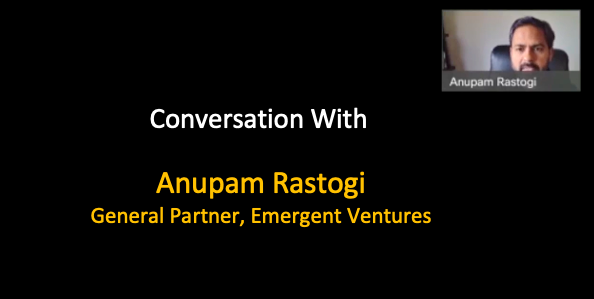Seed Capital
570th 1Mby1M Entrepreneurship Podcast with Anupam Rastogi, Emergent Ventures
Anupam Rastogi is General Partner at Emergent Ventures, a firm focused on B-to-B tech investments.
Podcast: Play in new window | Download
Subscribe: Apple Podcasts | Android | Google Play | Stitcher | TuneIn | RSS
570th Roundtable Recording with Anupam Rastogi, Emergent Ventures
In case you missed it, you can listen to the recording of this roundtable here:
1Mby1M Virtual Accelerator Investor Forum: With Gans Subramanian, Managing Partner at Hourglass Venture Partners (Part 2)
Sramana Mitra: Let’s do a couple of examples to illustrate what you’re saying with some more visceral understanding. Pre-seed is a very interesting field of investment. There aren’t that many pre-seed funds.
Gans Subramanian: There’s another company in the cybersecurity space. These founders have a clear view of the problem. They are technical founders and have a path to $100 million in 24 to 36 months. This is pre-seed. The founders have been talking to us for the last six months.
>>>Roundtable Recap: April 7 – Spotlight on Pre-seed Funding

During this week’s roundtable, we had as our guest, Anupam Rastogi, General Partner at Emergent Ventures, a firm focused on B-to-B tech investments.
You can listen to the recording of this roundtable here:
1Mby1M Virtual Accelerator Investor Forum: With Rahul Chandra, Managing Director at Arkam Ventures (Part 1)

Rahul Chandra, Managing Director at Arkam Ventures, is a veteran of the Indian Venture Capital industry. This discussion spans historical context to the current Unicorn mania. Great analysis!
>>>1Mby1M Virtual Accelerator Investor Forum: With Gans Subramanian, Managing Partner at Hourglass Venture Partners (Part 1)

Gans Subramanian, Managing Partner at Hourglass Venture Partners, is a former 1Mby1M Premium member who has now formed his own venture fund.
>>>1Mby1M Virtual Accelerator Investor Forum: With Naganand Doraswamy, Managing Partner and Founder at Ideaspring Capital (Part 4)
Naganand Doraswamy: The fourth one is, we want to ensure that we have visibility for $10 million to $15 million. One of the thesis we have in the fund is to enable sub-$100 million exits for product innovation companies in India. If you want to get a $70 million to $100 million exit, you should have $10 million to $15 million in revenue.
Unlike large funds, our goal is, can you become a $10 million to $15 million company. You have an option when you get to that point. We stay with our companies until that point. Our fund can’t participate in Series B. Then we’ll make a call on whether we should exit or stay partially. If we decide to exit, that’s when we help the founders exit.
>>>1Mby1M Virtual Accelerator Investor Forum: With Naganand Doraswamy, Managing Partner and Founder at Ideaspring Capital (Part 3)
Sramana Mitra: Our observation is that all deep tech out of India is going to be global companies, even the non-enterprise facing. What we are seeing though is people can validate with customers in India. They can get a dozen customers, get the product validated, get some revenue before coming out to the Valley. Especially in COVID, entrepreneurs love the fact that people are willing to buy without meeting them.
>>>